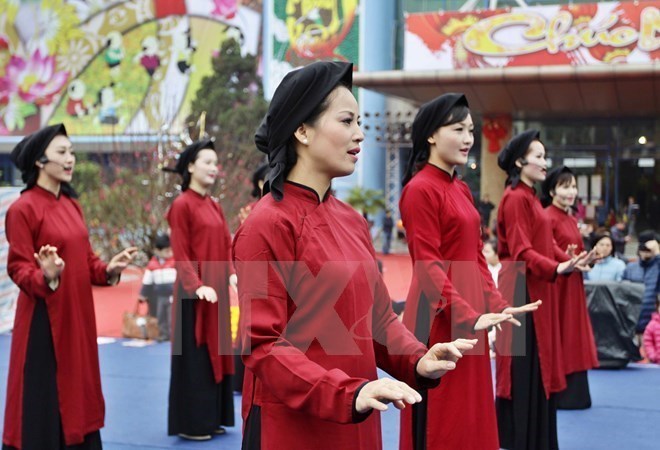
The northern province of Phu Tho launched a daily tour from Hanoi to the land of Hung Kings in early April, allowing tourists to explore traditional Xoan singing. The tour is designed to boost tourism and preserve the local intangible heritage, according to a local official.
Artists perform Xoan singing in Phu Tho province. (Photo: VNA).
The Hanoi – Phu Tho daily tour brings tourists to the Hung Temple relic site, Hung Kings Museum, Hung Lo ancient village and Lai Len Temple. Local artists perform Xoan (spring) singing between 2:00 pm and 4:00 pm at Hung Lo Communal House each day and at Lai Len Temple on weekends.
The new tour is not only vital for Phu Tho to attract more visitors but also helps the province preserve its cultural heritage, Xoan singing, which was put on UNESCO’s list of intangible cultural heritage of humanity in December last year, said Ha Ke San, Vice Chairman of the provincial People’s Committee.
Over the last six years, Phu Tho has worked to safeguard the folk music genre. It has established several Xoan singing clubs and taught it at schools across the province while training on Xoan singing performance has been also provided for promising singers, San noted.
"We hope senior artists and guild leaders will continue their training efforts to improve performing skills so visitors can get a better experience with the legacy,” said Director of the provincial Department of Culture, Sports and Tourism Nguyen Dac Thuy.
Xoan singing is practiced in Phu Tho province, often during the first two months of the lunar year. Traditionally, singers perform songs in sacred spaces such as temples, shrines and communal houses for spring festivals.
There are three forms of xoan singing: worship singing for the Hung kings and village guardian spirits, ritual singing for good crops, health and luck and festival singing where villagers alternate between male and female voices in a form of courtship.
Each Xoan music guild is headed by a leader, referred to as the "trum”, male instrumentalists are called "kep” and female singers "dao”.
Xoan singing is accompanied by dancing and musical instruments such as clappers and drums. The music has a sparse structure with few ornamental notes and simple rhythms, and Xoan is characterised by a modulation between singers and instrumentalists at the fourth interval. Knowledge for singing, dancing and playing drum and clappers are traditionally transmitted orally by the guild leader.
On the occasion of the Hung Kings Temple Festival, which is scheduled to take place between April 20 and 25 this year, Xoan singing performances will be held between 8:00 am and 4:00 pm every day at these two venues.
Legend has it that the Hung Kings ruled Vietnam from 2879 BC until 258 BC and are considered the founder of the nation. To honour the Kings, the tenth day of the Lunar March, which falls on April 25 this year, serves as the national commemorative anniversary for them.
Source: VNA
Located just a 20-minute drive from Hoa Binh City, Ora Hill Farmstay & Glamping Hoa Binh is a captivating new destination nestled in Mo hamlet, Bình Thanh commune, Cao Phong district. Combining farming with leisure, this tranquil retreat is perfect for those seeking balance, joy, and an immersive experience in the expansive beauty of nature.
Muong Bi - Tan Lac is renowned as one of the four famous Muong regions in Hoa Binh province. Blessed by nature with a favourable climate and stunning landscapes, Tan Lac holds great advantages for tourism development. The local tourism industry has made remarkable strides in recent times thanks to the attention and support from the local authorities and sectors.
With its strategic location, well-developed transport network, and diverse soil and climatic conditions, Hoa Binh is emerging as a must-visit destination in Vietnam's northwestern tourism corridor. The province boasts numerous attractions, including the Kim Boi hot springs (Kim Boi district), the Dau Rong cave complex (Cao Phong), the Mai Chau valley (Mai Chau), and the iconic Hoa Binh hydropower plant.
The northern mountainous province of Hoa Binh has been listed among the 71 most beautiful places to visit worldwide by the prestigious US travel magazine Condé Nast Traveller.
Hoa Binh province’s rich natural and cultural resources position it as a prime location for developing community-based tourism (CBT). In recent years, support from central and provincial policies, as well as assistance from non-governmental organisations, have encouraged local ethnic minority and mountainous communities to actively engage in the sector.



